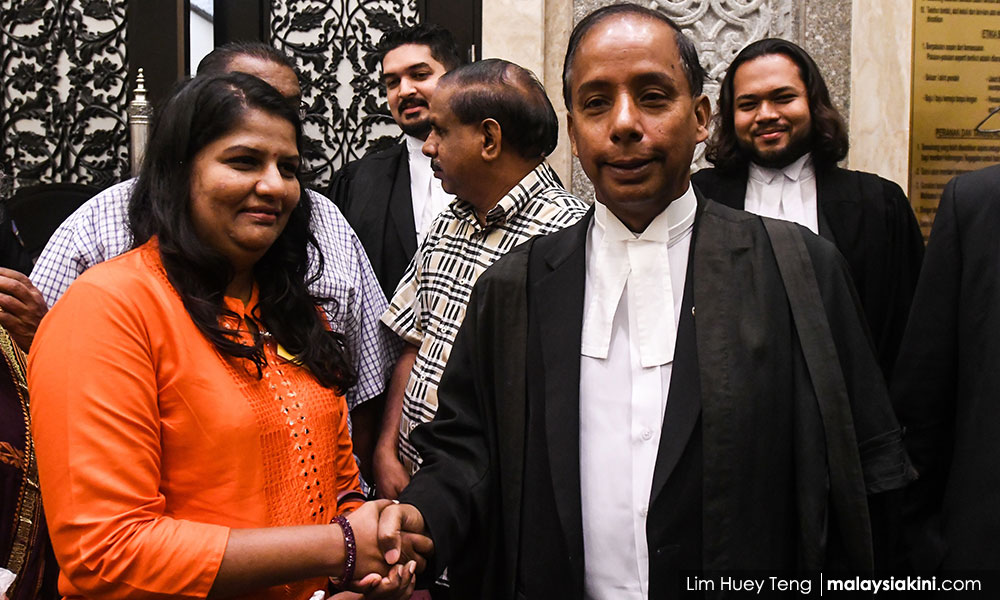COMMENT | How heartening it is to see the judgment of the Federal Court in the M Indira Gandhi case.
Its conclusion is clearly the correct decision. But it is one that, given how political currents are now flowing and have been for some time, I was not confident that any Malaysian court would now make.
One must salute the court’s courage and integrity. And its clarity of reasoning and judicial purpose.
The correct decision, why?
Why correct? To answer, we can put aside for the moment all the complex religious, historical, cultural and moral or ethical arguments.
All we need to do (as I have often argued over a number of years) is to look at matters of language, of semantics.
Put aside, too, the point that the Interpretation Act specifically says that in such instances, the singular should be read as plural etc. So that parental consent must mean, and be construed as, the consent of both parents.
Technically, legally, the whole case turns really on a simple, but very tricky, little word: in English “or”, in Malay “atau”.
The problem arises here when you try to translate “parent” into Malay. There is no simple equivalent term, no single word. So people “gloss” or render the expression and idea as “ibu atau bapa” [= mother or father].
And that is where this tricky little word gets in and makes (or is used to make) trouble in this matter of the conversion of children.
Making trouble? How?
In both English and Malay the word (a conjunction) “or/atau” has two distinct meanings and uses, though this complexity goes generally unrecognised:
For example, “do you want tea or coffee?”. “Siapa dia - Dollah atau Ahmad?”
This meaning is differentiating and excluding. One or the other, not both.
Yet think, too, of such expressions as “Prince Phillip or the Duke of Edinburgh” and “Tun Md Raus Sharif atau Ketua Hakim Negara”.
When we use such locutions, we are not talking about two people and giving the listener a choice which one they want to pick.
Semantics and legislation, drafting laws
Now, when the relevant legislation had to be rendered from English into Malay, the idea of “parent” was often conveyed as “ibu dan/atau bapa”.
There is no problem, no confusion or ambiguity, when you are talking about one parent. If it is a mother or father standing there (coming to a headmaster’s office to consult, for example), either will do, both are designated and equally qualify.
But when there are two, the question arises about the meaning - which meaning? - of that “or/atau” which holds and applies: is one or are both denoted? Does one parent suffice, or are two needed?
Of course, the people who wish to champion the idea and practice of unilateral conversion (conversion of a child on the word of one parent only, to the exclusion of the other) have all sorts of reasons for wanting to push that line: religious, cultural, legal and the like.
Framing legal arguments
But, those motivations aside, the important issue is: how did they proceed? What was their argument? On what technical legal basis did they advance their claim?
To do so, as they proceeded, they seized upon that “or/atau” as their legal lever: as a way to say that “parent” here means “one parent only suffices”.

Yet their doing so involved a major logical and semantic error. Their argument was fatally flawed.
How?
Because in moving from the idea of “parent” as “ibu atau bapa” to the claim that the “or/atau” here means that one parent might convert a child unilaterally, they were moving, perhaps without realising it, from one meaning of the word “or/atau” to the other in the middle of their argument.
This was, to use a technical term, an “illicit substitution”.
It involved a covert, even unrecognised, change from one meaning of the word “or/atau” to the other in mid-argument.
And you cannot change the meaning of your terms in mid-argument - it’s like jumping from one horse to another in the middle of a horse-race - without acknowledging that you are doing so and then justifying the move.
Yet that is what the proponents of “unilateral conversion” on the basis of substituting the “exclusionary, differentiating” meaning of “or/atau” for the “inclusive and combining” meaning were doing.
Doing that was, in simple terms, not just an elementary error of argument but an offence against logic and language, a scandal against reason and clear thinking.
How do such things come about?
We are dealing here in Malaysia with a conservative legal and judicial culture; one that shuns looking broadly, and even creatively, at the original historical context, meaning and purpose of legislation (and of constitutional articles too).
There is a preference for sticking to the strict analysis of words, of laws, to so-called “black-letter law” and interpretation.

The moment any lawyer sees a word on the page, they see an opening and rush to offer an interpretation that suits their purposes.
It is the same everywhere. And that is fine in a legal culture and situation where people understand language, both its formal rules and its delicate nuances of meaning, and have mastery over its subtleties.
But where, as is often and increasingly the case in Malaysia, people lack the language grounding and competence to meet - let us say - the required standards for matriculation from ordinary state secondary schools in fully English-speaking countries, disaster lies in wait.
People who lack basic mastery want to play advanced-level games, people who struggle, so to speak, with multiplication tables want to contribute to number theory and higher mathematics.
People who lack proper competence in English, on seeing that “or” in “mother or father”, imagine themselves to be Lord Denning, or elect to play the legal-interpretive game as if they were. So seeing what they imagine to be an opening, they leap in and “do their thing”. They advance interpretations and claims and promote arguments that are clearly unsustainable.
That is what happened here in the “ibu atau bapa” matter with the conversion of minors.
It is good that - and here I am going on the official press summary issued before the full judgment is made available - the Federal Court, proceeding in its own august way and by its own jurisprudential methods and forms of reasoning, has now set the matter straight.
CLIVE KESSLER is Emeritus Professor of Sociology and Anthropology at the University of New South Wales, Sydney.
The views expressed here are those of the author/contributor and do not necessarily represent the views of Malaysiakini.

